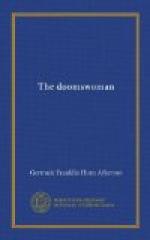This morning, however, she let the blue waters rise, not so much because they were stronger than her will, as because she wished to understand what was the matter with her. She was filled with a dull dislike of every one she had ever known, of every condition which had surrounded her from birth. She felt a deep disgust of placid contentment, of the mere enjoyment of sunshine and air. She recalled drearily the clock-like revolutions of the year which brought bull-fights, races, rodeos, church celebrations; her mother’s anecdotes of the Indians; her father’s manifold interests, ever the theme of his tongue; Reinaldo’s grandiloquent accounts of his exploits and intentions; Prudencia’s infinite nothings. She hated the balls of which she was La Favorita, the everlasting serenades, the whole life of pleasure which made that period of California the most perfected Arcadia the modern world has known. Some time during the past few weeks the girl had crossed her hands over her breast and lain down in her eternal tomb. The woman had arisen and come forth, blinded as yet by the light, her hands thrust out gropingly.
“It is that man,” she told herself, with angry frankness. “I had not talked with him ten minutes before I felt as I do when the scene changes suddenly in one of Shakespeare’s plays,—as if I had been flung like a meteor into a new world. I felt the necessity for mental alertness for the first time in my life; always, before, I had striven to conceal what I knew. The natural consequences, of course, were first the desire to feel that stimulation again and again, then to realize the littleness of everything but mental companionship. I have read that people who begin with hate sometimes end with love; and if I were a book woman I suppose I should in time love this man whom I now so hate, even while I admire. But I am no lump of wax in the hands of a writer of dreams. I am Chonita Iturbi y Moncada, and he is Diego Estenega. I could no more love him than could the equator kiss the poles. Only, much as I hate him, I wish I could see him again. He knows so much more than any one else. I should like to talk to him, to ask him many things. He has sworn to marry me.” Her lip curled scornfully, but a sudden glow rushed over her. “Had he not been an Estenega,—yes, I could have loved him,—that calm, clear-sighted love that is born of regard; not a whirlwind and a collapse, like most love. I should like to sit with my hands in my lap and hear him talk forever. And we cannot even be friends. It is a pity.”
The girl’s mind was like a splendid castle only one wing of which had ever been illuminated. By the light of the books she had read, and of acute observation in a little sphere, she strove to penetrate the thick walls and carry the torch into broader halls and lofty towers. But superstition, prejudice, bitter pride, inexperience of life, conjoined their shoulders and barred the way. As Diego Estenega had discerned, under the thick Old-World shell of inherited impressions was a plastic being of all womanly possibilities. But so little did she know of herself, so futile was her struggle in the dark with only sudden flashes to blind her and distort all she saw, that with nothing to shape that moulding kernel it would shrink and wither, and in a few years she would be but a polished shell, perfect of proportion, hollow at the core.




